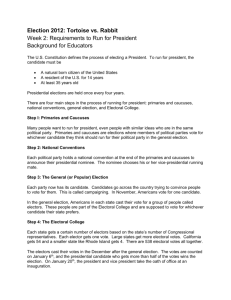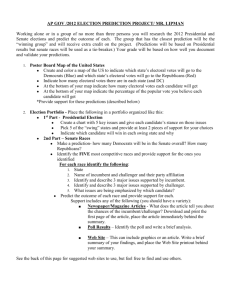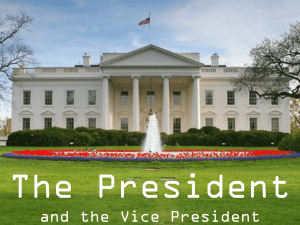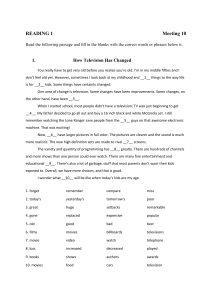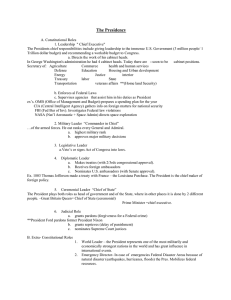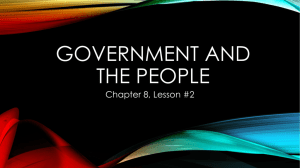File
advertisement
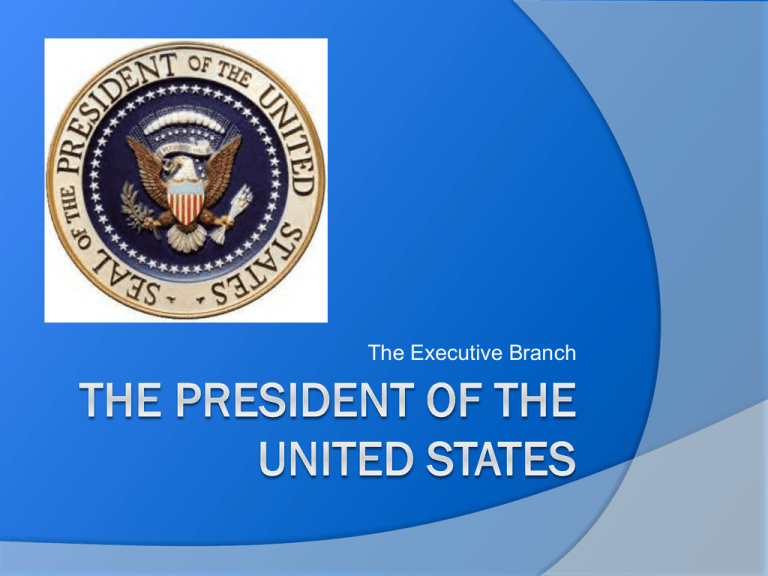
The Executive Branch This Guy? What are the roles of the President? George H.W. Bush, Barack Obama, George W. Bush, Bill Clinton, Jimmy Carter Chief of State The President is the main symbol of the United States. He is the “first” citizen. Chief Executive/Administrator Head of the Executive Branch and all the departments under it. Manages over 3 million employees and over $2 TRILLION dollars. Chief Diplomat Person most responsible for communicating with other countries, and making deals with other countries. Commander in Chief The President controls the military. He is the boss of the generals. Chief Legislator The President suggests many bills. The President can Veto bills. Sets the shape of the congressional agenda Chief of his/her Party Leader or Symbol of party Qualifications Must be 35 years of age by the time he/she enters office Must be a natural born citizen Must have lived in the U.S. for the last 14 years The President’s term Each term is Four (4) years. He can only be elected Two (2) times. He can serve for a maximum of Ten (10) years. Franklin Delano Roosevelt (elected to 4 terms) If VP is moved up and serves less than 730 days or two years 22nd Amendment (1951) created the current rules Presidential Succession If the President dies…… the Vice President becomes President. If they both die, the Speaker of the House gets the job. Then… President pro tem of the Senate. Then… cabinet members in the order their department was created. Joe Biden VP Paul Ryan, WI: Speaker of the House Orrin Hatch, UT: President Pro Tempore Senate The Vice President Speaker of the House President pro tempore of the Senate Secretary of State Secretary of the Treasury Secretary of Defense Attorney General Secretary of the Interior Secretary of Agriculture Secretary of Commerce Secretary of Labor Secretary of Health and Human Services Secretary of Housing and Urban Development Secretary of Transportation Secretary of Energy Secretary of Education Secretary of Veterans Affairs Secretary of Homeland Security Pay and Benefits US Constitution, Article II, Section 1 The President shall, at stated times, receive for his services, a compensation, which shall neither be increased nor diminished during the period for which he shall have been elected, and he shall not receive within that period any other emolument from the United States, or any of them. Pay and Benefits $400,000 a year, to be paid monthly Expense allowance of $50,000 Pay and Benefits … Official Business ○ Presidents pay for Tax payers are food lodging and incidental items ○ Tax payers pay for travel on official carriers and salaries of this who travel with the president responsible for the following: ○ Travel for Official Business ○ Salaries of those who work for the President ○ Those who maintain operations in the White House ○ State Dinners Vacation Time Life in the White House: ○ Personal items paid for by the first family Electing the President ORIGINS OF THE ELECTION Framers overly concerned with the process of picking a new President. Two most obvious ways to pick a President: ○ 1.) Congress ○ 2.) Direct Vote What is wrong with these selections? First Electoral College Plan put forth by Alexander Hamilton: President / Vice President to be chose by Presidential Electors. Each elector gets two votes: ○ Candidate with the most votes becomes President, ○ Candidate with the second most votes becomes Vice President ○ Regardless of party. Hits and Misses Election of 1796: John Adams: Federalist Candidate Thomas Jefferson: Democratic-Republican THEY HATE EACH OTHER Jefferson loses by 3 votes (original electoral college) Adams becomes President Jefferson Vice President. Hits and Misses Election of 1800 Jefferson and Adams had created two well defined Parties by this point Tie in the election eventually won by Jefferson CREATED: ○ Party nominations ○ Electoral college members will vote based on their party’s presidential ticket ○ Electors no longer acting as free agents 12th Amendment Added to the constitution in 1804 “The Electors… shall name in their ballots the person voted for as President, and in distinct ballots the person voted for as VicePresident…” Electing the President Step #1 – “Be Somebody” ALL Presidents were either: Members of the House or Senate Governors of States Military Generals Vice-Presidents Presidential candidates are usually influential people within their party. Step #2 – Win the Primary Each party holds a Primary Election months before the election (some states hold caucuses). The candidate who wins the most votes represents the party in the general election. Step #3 – Win the General Election Held the first Tuesday in November, every four years. The candidate who wins over half of the Electoral College votes wins the election. The Electoral College Based on population, each state has a certain number of “Electors.” Whoever wins the most votes in a state gets ALL of the Electors’ votes. What are the exceptions? ○ Nebraska & Main Electors cast their votes after the General Election. Winning candidates must have over half of the votes. The Popular Vote The sum of each individual vote (yours and mine). It maters within the state, but NOT nationally. Can a candidate win the popular vote but lose the election? When does Congress Step In? If no candidate gets over half of the electoral votes… The House of Representatives votes to decide who becomes President. Executive Departments Department Heads There are 15 different executive departments that the President supervises. The leaders of the departments are given the title “Secretary.” The secretaries are the president’s “Cabinet.” •State Department •Department of the Treasury •Department of Defense •Department of Justice •Department of the Interior •Department of Agriculture •Department of Commerce •Department of Labor •Department of Health and Human Services •Department of Housing and Urban Development •Department of Transportation •Department of Energy •Department of Education •Department of Veterans Affairs •Department of Homeland Security State Department Takes care of relationships with foreign countries. Meets with leaders of other countries. Negotiates treaties. Supervises Embassies and other diplomats. Department of Treasury Regulates the nation’s banking systems. Prints money. Defense Department Supervises the Military and defense industries. Department of Justice Supervises FEDERAL law enforcement agencies and attorneys. Secretary is called the Attorney General. Department of the Interior Manages the country’s natural resources. Department of Commerce Regulates businesses and financial markets. Department of Homeland Security Coordinates information form FBI, CIA, NSA, military and local law enforcement agencies. Created after 9/11 Executive Powers Article II This part of the Constitution creates the executive branch and establishes its powers. Over time powers have expanded and have been approved by the Supreme Court. Makes the Federal Budget Oversees the Office of Management and Budget, which plans out how much the will be spent and what it will be spent on. Congress has to approve all taxes and spending. Military Powers The president is Commander in Chief He can send troops to war (for 60 days without Congress approval). Can call the National Guard into action On American Soil Is the only person who can authorize nuclear weapons. Kent State (1970) LA Riots (1992) Appointments Judges Cabinet Members 6,000 other positions You’re Hired! Power of Clemency The president can: Pardon – forgive people for crimes (set them free) Commute – reduce the sentences of criminals Give Amnesty – pardon whole groups of people. Executive Agreements The president can make deal with other countries (without Congress approval). Emergency Powers Can send troops / agencies to deal with disasters. In times of war can declare martial law, suspend rights, etc. Executive Privilege The right to keep information from the public – if it is in the interest of national security. Legislative Powers Can Veto laws passed by Congress.

